Key takeaways:
- Encrypted messaging apps enhance privacy by scrambling messages into unreadable code, ensuring only intended recipients can decipher them.
- Key benefits include enhanced security, privacy control, and reduced risk of identity theft, fostering confidence in communication.
- Choosing the right app is crucial; popular options like WhatsApp, Signal, and Telegram each have unique features impacting user privacy.
- Common misconceptions include believing encryption is foolproof and that such apps are only for those with something to hide, highlighting the importance of understanding security differences.
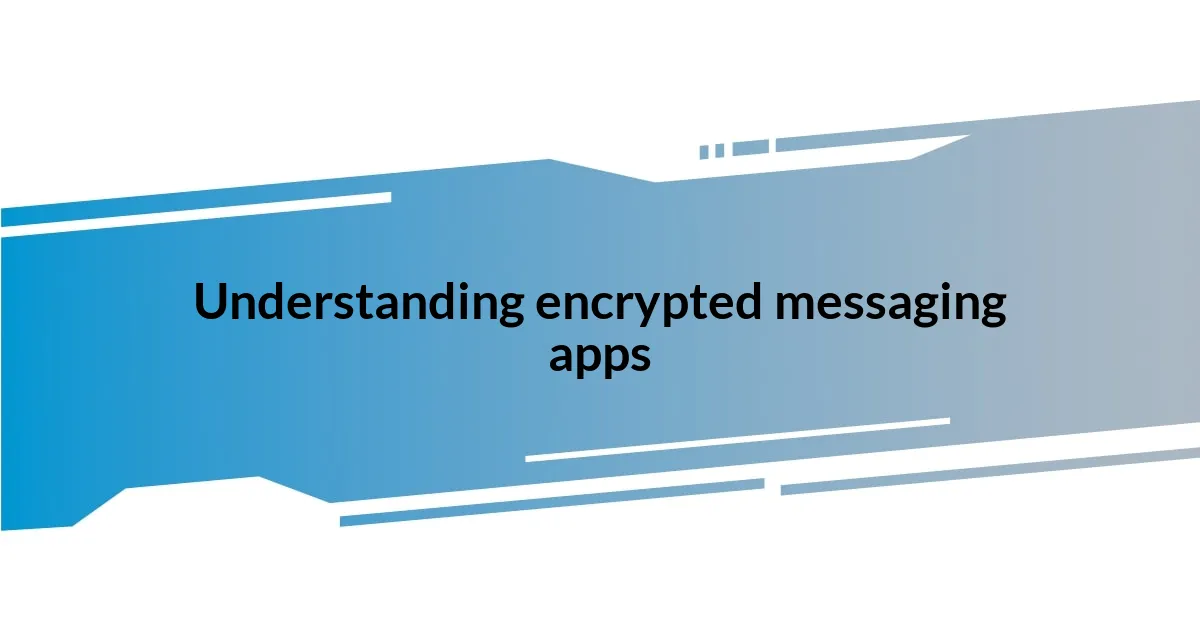
Understanding encrypted messaging apps
Encrypted messaging apps provide a layer of security that traditional text messages simply can’t match. I remember the first time I sent a confidential message through an encrypted platform; it felt like I was sending a letter sealed in a vault. Have you ever experienced that sense of relief knowing that your private conversations are protected from prying eyes?
Understanding how these apps work gives you insight into why they’re so important today. Encryption scrambles your messages into unreadable code that can only be deciphered by the intended recipient. When I learned about end-to-end encryption, I felt empowered; it really made me appreciate the power of privacy in our digital lives.
There are various types of encryption techniques, but not all apps offer the same level of security. I’ve tried a few with differing results, and I’ve realized that choosing the right one is crucial. Have you considered how much you trust the app you’re using? I find it fascinating how a simple choice in messaging can impact our privacy dramatically.
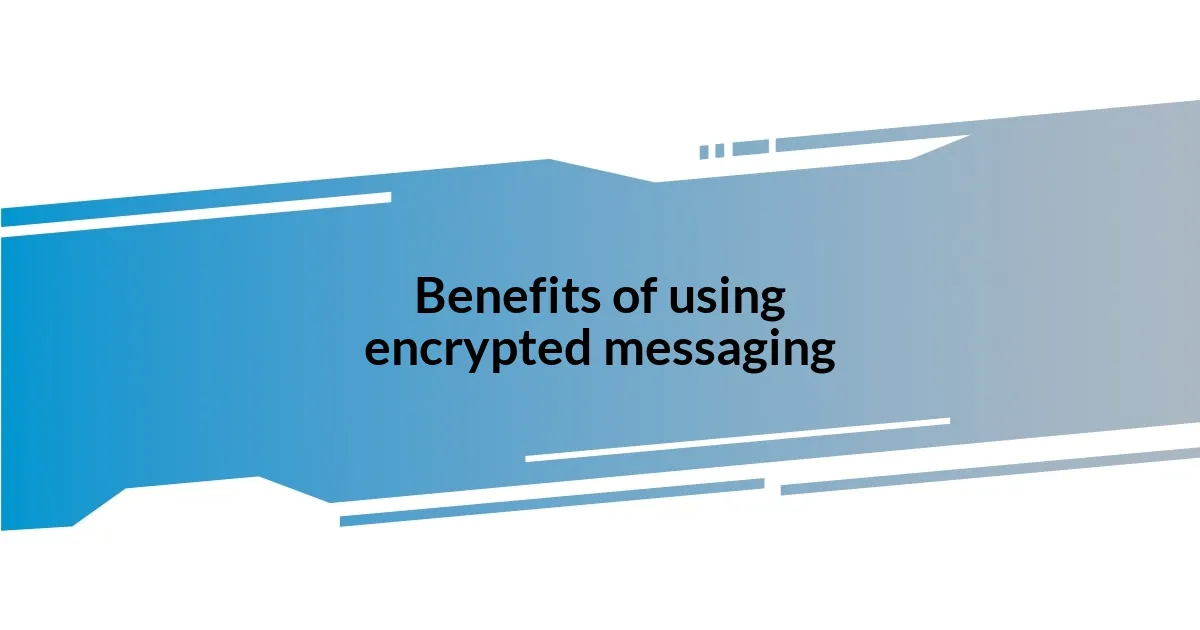
Benefits of using encrypted messaging
When I think about the benefits of using encrypted messaging, the first thing that comes to mind is peace of mind. Knowing that my conversations are secure allows me to communicate freely without the anxiety of someone intercepting my messages. Once, I was discussing a sensitive project at work. The relief I felt when realizing my messages were encrypted was palpable—it allowed me to focus on my work rather than worrying about unwanted intrusions.
Here are some key benefits I’ve noticed using encrypted messaging apps:
- Enhanced Security: Messages are protected against unauthorized access, keeping your conversations private.
- Privacy Control: You have more control over who sees your messages and when they can access them.
- Reduced Risk of Identity Theft: Encrypted messaging reduces the likelihood of personal information being stolen during communication.
- Confidence in Communication: Knowing your messages are secure fosters a sense of trust in the app, leading to more open dialogues.
- Peace of Mind: I genuinely feel more relaxed knowing that what I share remains confidential.
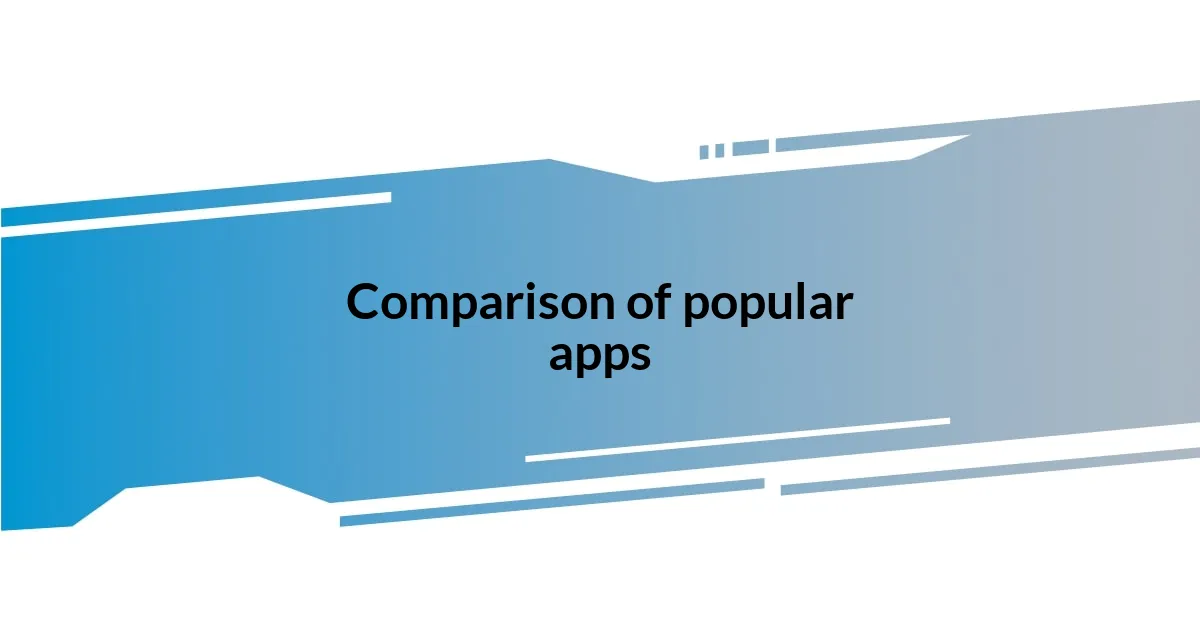
Comparison of popular apps
When comparing popular encrypted messaging apps, I’ve noticed that each offers unique features tailored to different user needs. For instance, WhatsApp is widely recognized for its user-friendly interface and end-to-end encryption, but I find the metadata retention concerning. On the other hand, Signal prioritizes privacy with minimal data collection, which is something I genuinely appreciate in today’s digital age.
Another notable contender is Telegram, which, despite its strong encryption, can be a bit misleading since only secret chats are fully end-to-end encrypted. I remember trying to coordinate a surprise party with friends over this app, and while it was functional, I had to ensure everyone was using the secret chat feature—just something to keep in mind. With these differences, understanding which app aligns best with your privacy concerns can be a game-changer.
Lastly, the choice of app often reflects broader privacy philosophies. For example, I lean towards Signal for its commitment to security, but I also understand that some people may prefer convenience over extreme privacy measures. Personal preferences definitely influence my choice, and it’s worth considering what aspects of communication matter most to you.
| App | Key Features |
|---|---|
| User-friendly, end-to-end encryption, metadata retention | |
| Signal | Minimal data collection, highly secure messaging |
| Telegram | Strong encryption but limited to secret chats |
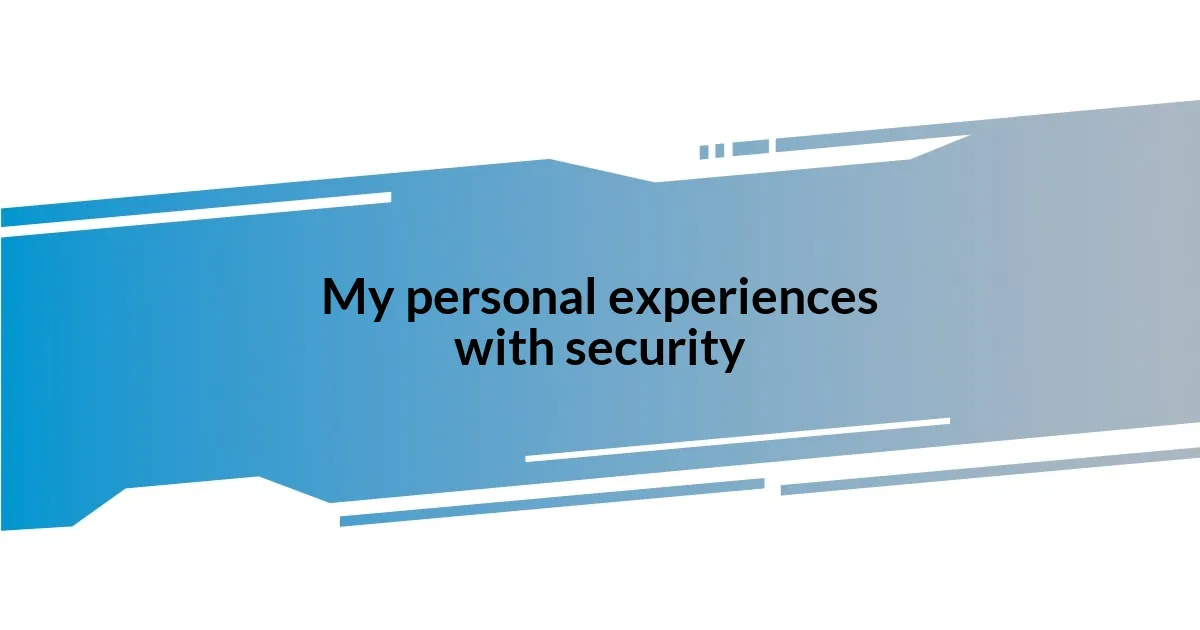
My personal experiences with security
When I first started exploring encrypted messaging apps, my main concern was security. I remember a moment when I received a message from a colleague discussing a project that could potentially impact our company’s future. The instant I realized the conversation was happening over an encrypted platform, I felt a wave of relief wash over me. Has this ever happened to you? That feeling of trust in a digital space is invaluable.
A memorable experience was during a personal crisis when I relied heavily on an encrypted messaging app to communicate with close friends. Sharing vulnerable thoughts while knowing the content wasn’t being monitored gave me the courage to be open. It’s quite striking how the atmosphere shifts when you understand that your words are shielded from prying eyes—can you imagine how liberating that must feel?
I also recall a time I decided to switch to a more privacy-focused messaging app after a friend had their data compromised. The process felt daunting at first but was well worth it. It made me think: how much do we compromise our security for convenience? Switching apps deepened my appreciation for the lengths some platforms go to protect users, and I felt empowered by regaining control over my personal data.
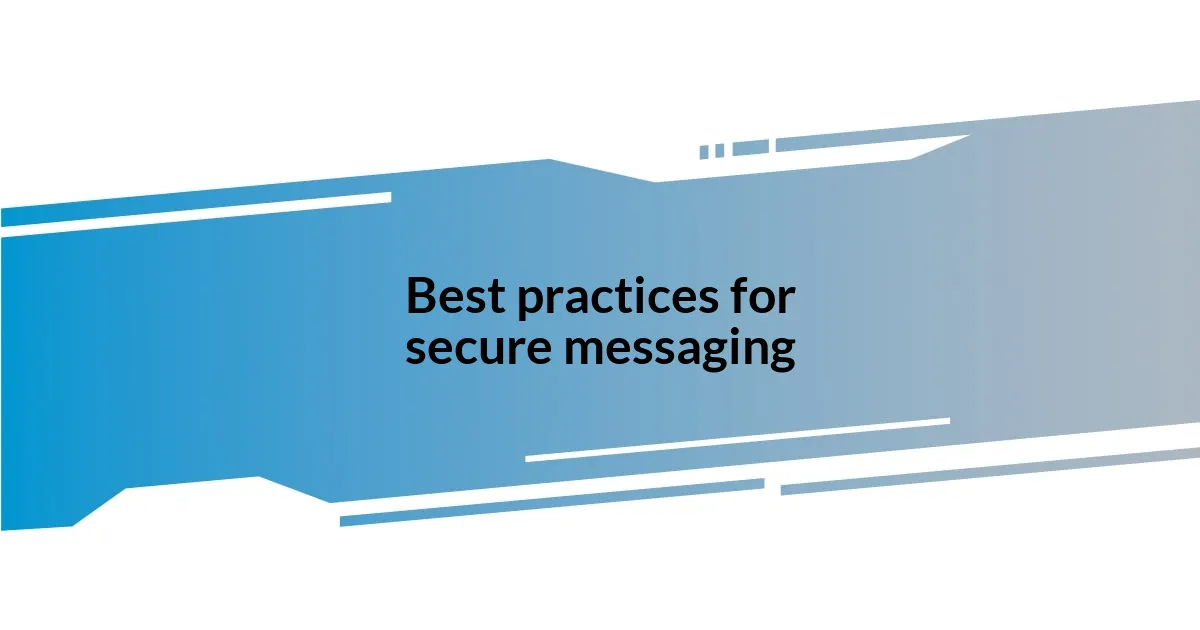
Best practices for secure messaging
One of the best practices I’ve discovered for secure messaging is to always enable two-factor authentication (2FA) on your messaging app. When I first set this up for my accounts, I felt much more secure knowing that even if someone had access to my password, they wouldn’t easily get into my messages. It’s like locking your front door and then installing an extra security system—why not add that layer of protection?
Another thing to keep in mind is to regularly update your messaging app. I remember a time when I overlooked an update that included vital security patches. After reading about vulnerabilities being exploited, I kicked myself for not prioritizing those updates sooner. It’s an easy step but can make a substantial difference in keeping your conversations safe from prying eyes.
Lastly, be mindful of what you share, even in encrypted chats. It’s tempting to spill all your secrets when you feel secure, but I’ve learned that nothing truly “disappears” on digital platforms. Imagine feeling a bit exposed after sending a confession you thought was private. Always consider the potential long-term consequences of sharing sensitive information online—it’s a good habit that could save you from future regret.
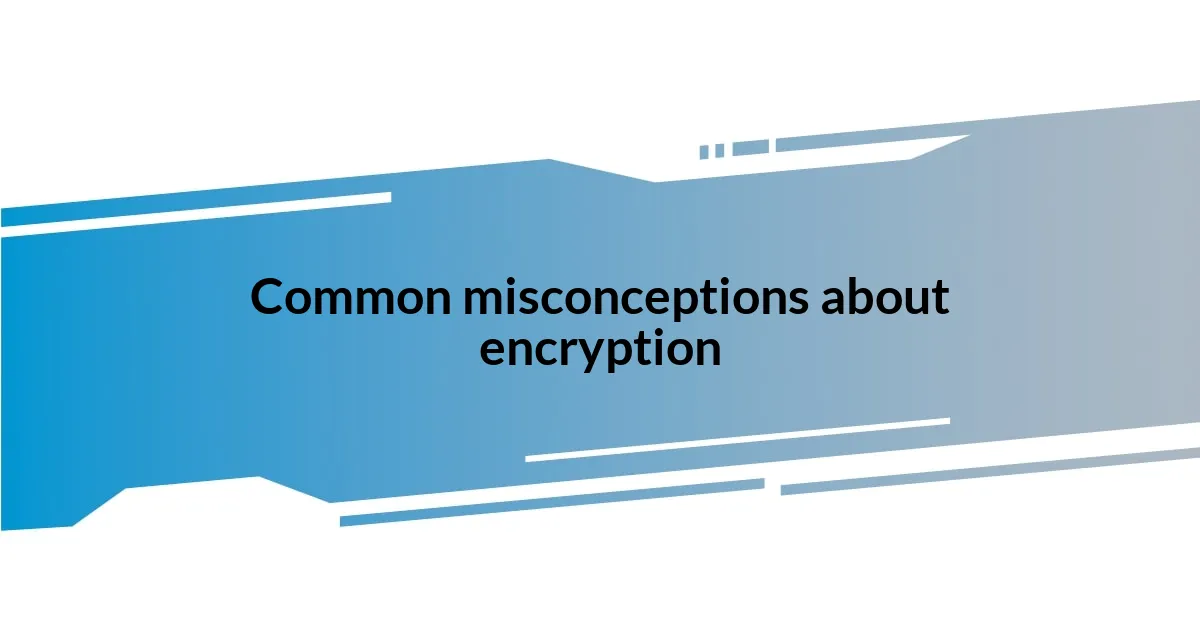
Common misconceptions about encryption
When discussing encryption, one common misconception is that it makes communication entirely foolproof. I remember a conversation I had with a tech-savvy friend who confidently claimed that using encryption meant no one could access our messages. However, encryption merely obscures the content; if someone had physical access to our devices or managed to trick us into sharing information, the security would crumble. It’s a reminder that trust and caution must accompany any form of digital communication.
Another myth is that people assume encrypted messaging apps are only for those with something to hide. Reflecting on my own experience, I once hesitated to switch to an encrypted app because I thought it would give others the wrong impression. But as I learned more, I realized encryption is about safeguarding everyone’s right to privacy, not just shielding illicit activities. In an age where data breaches are common, isn’t it sensible to protect ourselves irrespective of the nature of our conversations?
Finally, many believe that all encrypted messaging apps provide the same level of security. I’ve switched between a few different platforms and quickly noted significant differences in their encryption methods. One app made me feel far more at ease with its end-to-end encryption compared to others that relied on encryption “in transit” only. This experience taught me the importance of researching the specific security features each app offers—don’t you think it’s worth a little extra effort to ensure your conversations are genuinely secure?
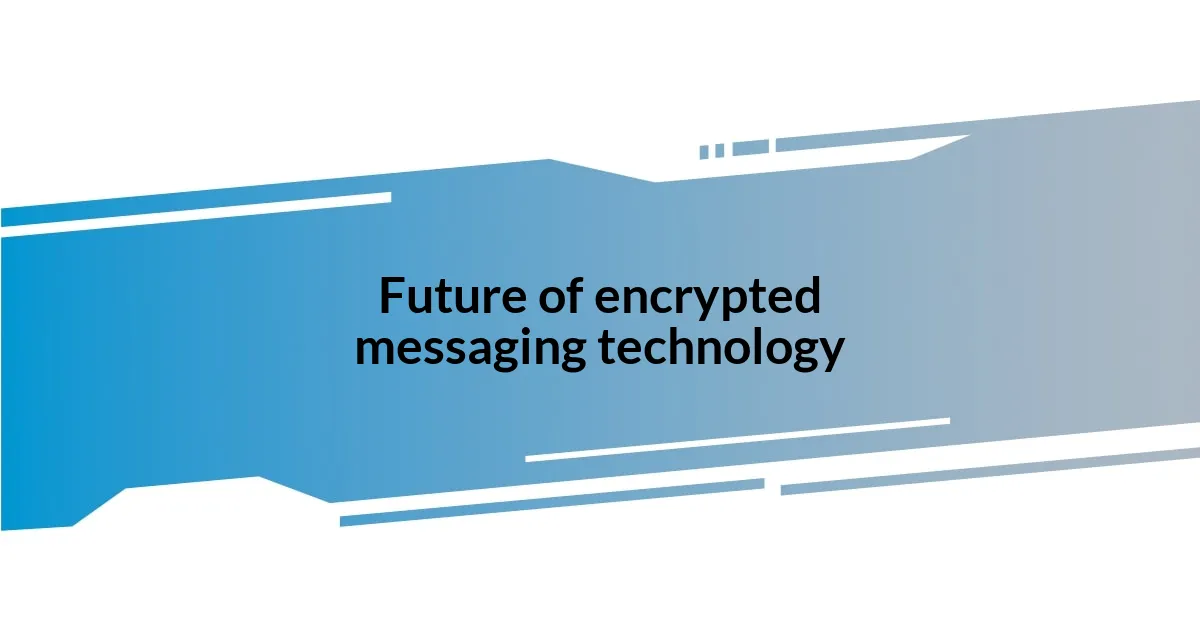
Future of encrypted messaging technology
The future of encrypted messaging technology is shaping up to be increasingly sophisticated. As I’ve observed, developers are harnessing advancements in artificial intelligence (AI) to enhance security protocols. Imagine an app that can adapt its encryption on the fly based on potential threats—it sounds like something straight out of a sci-fi movie, doesn’t it? This kind of adaptability could make our conversations not just secure but also intelligent in how they protect our privacy.
Moreover, the integration of blockchain technology is likely to play a significant role moving forward. I once dove deep into the concept of decentralized data storage, and it opened my eyes to the possibilities. Using blockchain could mean that no single entity controls user data, making it even harder for bad actors to intervene. Isn’t it wild to think that our messaging might one day be as secure as cryptocurrency transactions?
As we continue to navigate concerns over privacy and censorship, I can’t help but wonder how these technologies will evolve. Will future updates empower users to have even more control over their data? I hope to see features that not only protect privacy but also empower users to truly understand their security. It’s an exciting prospect—what new innovations will we uncover in this digital journey of ours?